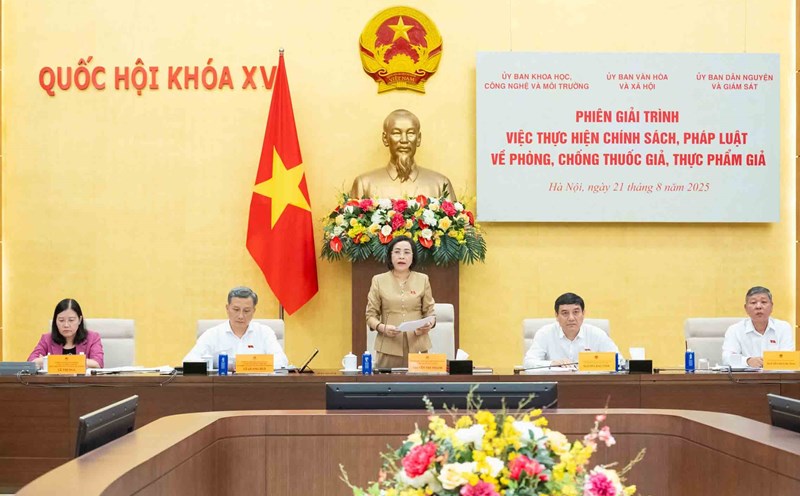Prosecution of director of production of 2.7 million liters of fake oil
On October 21, 2025, the Economic Police Department of Nghe An Provincial Police prosecuted and temporarily detained Phan Thi Mai (born in 1977, residing in Thuan Trung Commune, Nghe An) - Director of An Thinh Food Trading Company Limited, for the crime of "production and trading of counterfeit food" under Clause 3, Article 193 of the Penal Code.
On June 17, 2025, the authorities suddenly inspected the company in Do Luong district, seizing 3,934 boxes (cans) of Keva Gold branded cooking oil, with a total weight of 37,618 liters. The results of the assessment showed that the cooking oil product ( palm oil) did not supplement vitamin A as advertised, but still stated "to be enhanced with vitamin A" to deceive consumers. The effective natri content is only below 0.3mg/100g, equivalent to less than 1.3% of the published level of 23.7mg/100g. All the cooking oils were identified as counterfeit.
From April 2024 to its discovery, the company has produced more than 2.7 million liters of fake oil, worth about 75 billion VND, distributed to many dealers in Nghe An, Quang Tri, Hue, Quang Ngai and Dak Lak. Currently, the police are expanding the investigation to strictly handle the related individuals.

Preventing toxic foods from leaking onto the market
Previously, on September 17, 2025, the Investigation Police Agency of Nghe An Province Police issued a decision to prosecute the case and prosecute the accused Nguyen Thi Mai (born in 1982, residing in Tien Phong hamlet, Van An commune) for the crime of "Violating regulations on food safety" under Clause 1, Article 317 of the Penal Code. Through investigation, Van An Commune Police coordinated with an interdisciplinary team of the Commune People's Committee to discover that Nguyen Thi Mai illegally slaughtered pigs and sold meat with signs of disease infection. The authorities seized 2 slaughtered pigs with 286kg of finished meat that had not been quarantined and an additional 98.5kg of pork at the residence, both of which had no signs of slaughter control and showed signs of infection.
At the investigation agency, Mai confessed to using pigs infected with African swine fever - the type that must be destroyed according to regulations - to process and sell on the market. This is the first case in Nghe An to criminally handle the use of infected animals as food in the context of complicated African swine fever.
With high determination and synchronous coordination, Nghe An Police have cracked down on many large-scale food safety-related cases, preventing toxic products from leaked onto the market. On April 18, 2025, the Department of Investigation Police on Corruption, Economic Crimes and Smuggling of Nghe An Provincial Police initiated a case, prosecuted the accused and temporarily detained 4 subjects for the crime of "Violating regulations on food safety". The subjects include: Luu Manh Huong (born in 1993), Luu Van Trung (born in 1997, all residing in Truc Hung commune, Truc Ninh district, Nam Dinh), Tran Khac Duy (born in 1990) and Nguyen Van Huong (born in 1998, all residing in Truong Vinh ward).
Investigation results show that this group produces bean sprouts with chemicals that prohibit "candy water" - 6-Benzylaminopurine (6-BAP) to stimulate growth, making bean sprouts fat, short-rooted, and easier to sell. This is a banned substance that can damage the lungs, cause hormonal disorders, and even death.
Nghe An Police coordinated with interdisciplinary forces to inspect 4 bean sprout production facilities, seizing nearly 2,000 rollers containing bean sprouts (about 25 tons), 25 liters of pure chemicals 6-BAP and 150 liters of mixed solutions. From 2024 until their arrest, the group of subjects had produced and consumed 3,500 tons of chemically soaked bean sprouts, illegally profiting billions of dong. This is the first project in Nghe An to handle the use of banned chemicals in food production.
According to Nghe An Provincial Police, the above cases demonstrate the strong and synchronous direction of the authorities. Consecutive successful projects have prevented thousands of tons of counterfeit, infected and toxic chemicals from circulating on the market, contributing to protecting people's health, stabilizing economic security and social order.












